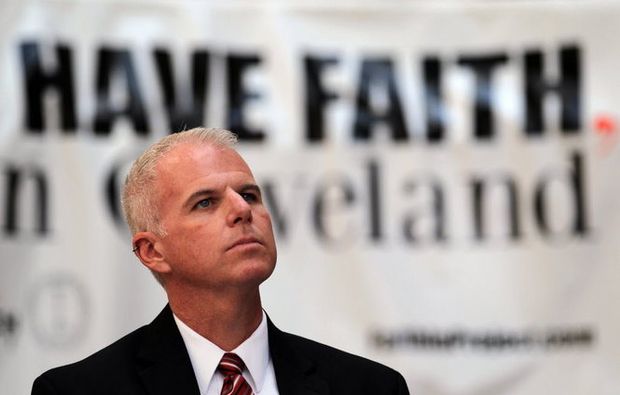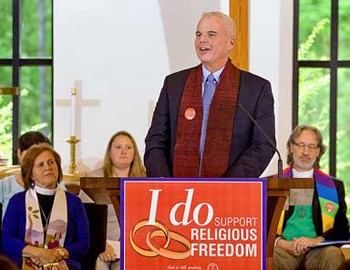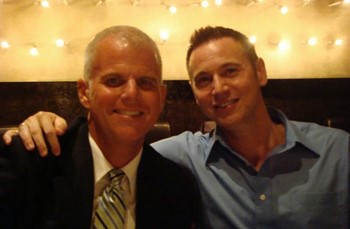The Rev. Dr. J. Bennett Guess (born July, 1966) was the first openly gay person to be elected an Executive Minister and National Officer of the United Church of Christ. He currently serves as Executive Director of the ACLU of Ohio, a position he’s held since June 2017.
Ben was among the earliest out clergy in the UCC’s Indiana-Kentucky Conference (1992-2000); pastored the first congregation in Kentucky to become Open and Affirming (1994); and became the first openly LGBTQ person elected to the UCC’s Collegium of Officers (2011-2016).
A native of Henderson, Ky., and a 1988 graduate of the University of Kentucky (journalism), Ben was an out-gay student at Vanderbilt University Divinity School, graduating in 1991.
Ben served as VDS student body president and a Vanderbilt Graduate Scholar in-Residence (1990-91). He also completed graduate studies in public policy and administration at Murray State University.

At Vanderbilt, Ben took the required polity, history, and theology courses for both the United Methodist Church and the United Church of Christ, recognizing that eventually he might need to pursue ministerial authorization in the more welcoming UCC. Still, Ben hoped and worked for change in the UMC tradition of his childhood.
Ben was ordained a “probationary member” of the then-Louisville Conference of the United Methodist Church on May 24, 1990, while serving a circuit of four rural UMC congregations in far-western Kentucky (1988-1991). After receiving his M.Div. degree, Ben was appointed to serve full-time as pastor of Belleview United Methodist Church in Smith Mills, Kentucky. Ben continued living a quasi-open life, both socially and in ministry. He occasionally filled the pulpit at the largely-LGBTQ Metropolitan Community Church in nearby Evansville, Indiana, which was the center of his social circle of LGBTQ friends.
 Ben held out hope – somewhat naively in hindsight – that the UMC General Conference in April 1992 would adopt changes to the Book of Discipline, as recommended by a four-year denominational commission on human sexuality, to allow for “self-avowed, practicing homosexuals” to serve openly. At that General Conference, Ben participated in protests, public witness events, and inclusive worship services in hopes of persuading delegates to open the doors of the denomination.
Ben held out hope – somewhat naively in hindsight – that the UMC General Conference in April 1992 would adopt changes to the Book of Discipline, as recommended by a four-year denominational commission on human sexuality, to allow for “self-avowed, practicing homosexuals” to serve openly. At that General Conference, Ben participated in protests, public witness events, and inclusive worship services in hopes of persuading delegates to open the doors of the denomination.
When the General Conference voted to retain its prohibitions on, and condemnation of, openly LGBTQ clergy, Ben sought to transfer his ministerial standing into the Evansville/Tri-State Association (Indiana-Kentucky Conference) of the United Church of Christ. Ben also had secured a pastoral call from a small, struggling local UCC church in need of a minister.
Ben’s sexual orientation was never raised during several meetings with the Association’s Committee on Ministry, which recommended him for privilege of call in the UCC. However, at Ben’s ecclesiastical council in August 1992 at St. Lucas UCC in Evansville, Indiana, a conservative anti-gay pastor stood to question Ben’s sexual orientation, indicating disapproval that many gay and lesbian clergy were coming into the UCC from other denominations.
Ben responded truthfully that he had entered a pact with several fellow students at Vanderbilt Divinity School – both straight and LGBTQ – that each would refuse, in solidarity, to answer any questions related to sexual orientation posed by their respective ecclesiastical bodies, believing it unjust and inequitable for some to be offered heterosexual privilege while others faced discrimination in/by the church. Instead, Ben called the question inappropriate and not germane when determining one’s fitness for ministry or in discerning God’s call and claim on someone’s life. Ben asked the approximately 70 lay and clergy delegates in attendance, representing about 35 UCC congregations, to consider his gifts and graces for ministry, whether he be gay or straight. Ben was approved for authorized ministry in the United Church of Christ – by only a 7-vote margin.
 Ben served Zion UCC in Henderson, Kentucky, for eight years, helping the congregation of 12 older members grow into an inclusive, justice-focused church of nearly 300. In 1992, he founded Henderson’s annual Peace with Justice Week celebration, a national gathering of peace and justice activists, which brought many thousands to Henderson over its 25-year run (1992-2016).
Ben served Zion UCC in Henderson, Kentucky, for eight years, helping the congregation of 12 older members grow into an inclusive, justice-focused church of nearly 300. In 1992, he founded Henderson’s annual Peace with Justice Week celebration, a national gathering of peace and justice activists, which brought many thousands to Henderson over its 25-year run (1992-2016).
Ben was the founding co-chair of the Kentucky Fairness Alliance (1992-1997), the state’s LGBTQ political advocacy organization. He served as an out-gay member of the Kentucky Council of Church’s executive board, and on the ACLU of Kentucky board. He served two terms on the UCC Evansville/Tri-State Association’s Committee on Ministry and as chair of its Social Justice Committee.
In 1996, Ben was a co-founder of Matthew 25 AIDS Services in Henderson, which formed out of Zion UCC’s struggles to serve those infected and affected by HIV/AIDS. Today, Matthew 25 is one of the largest HIV service providers in Kentucky and surrounding states.
Ben also led efforts to successfully open an on-site Planned Parenthood clinic at Zion UCC, which was met with considerable right-wing opposition in the community.
For his “courage in the struggle for justice and peace,” Ben received the national Just Peace Award at the UCC’s 1997 General Synod.
In 1999, Ben led a successful campaign to enact a LGBTQ non-discrimination ordinance in Henderson, the first small city to do so after Louisville and Lexington passed one the same year. In 2001, the ordinance was rescinded (but ultimately restored in 2019.)
In 2000, Ben joined the UCC’s national staff in Cleveland, serving in various capacities: Minister for Economic Justice (2000-2001), Justice and Witness Ministries’ Minister for Communications (2001-2003), Editor of United Church News (2003-2007), UCC Director of Communications (2007-2011), Executive Minister of Local Church Ministries (2011-2016), and Vice President of the Council for Health and Human Service Ministries (2016-2017).
 Ben earned his Doctor of Ministry degree in 2001 from Chicago Theological Seminary, which awarded him its Distinguished Alumni Award in 2014.
Ben earned his Doctor of Ministry degree in 2001 from Chicago Theological Seminary, which awarded him its Distinguished Alumni Award in 2014.
In 2014, Ben was a lead spokesperson for the UCC’s victorious lawsuit that brought marriage equality to North Carolina. In UCC v. Cooper, the UCC successfully argued that the state’s anti-gay Amendment One violated the First Amendment guarantee of religious freedom. Upon appeal, the case eventually brought marriage equality to the entire U.S. Fourth Circuit (Maryland, Virginia, West Virginia, North Carolina, and South Carolina).
At the ACLU of Ohio, Ben leads the statewide organization’s legal, organizing, and advocacy efforts for criminal justice reform, racial justice, voting rights, LGBTQ equality, reproductive freedom, First Amendment protections, and more. His work with the ACLU is his recognized ministry setting via a four-way covenant with the UCC’s Living Water Association and Pilgrim Congregational UCC in Cleveland. Ben is a member of the Association Council of the Living Water Association.
A former board member of the National LGBTQ Task Force, Ben is also a member of the board of directors of the Cleveland Museum of Contemporary Art and a 2019 graduate of Leadership Columbus.,
Ben and his husband, Jim Therrien, have been together since 2001, celebrating their union at a 2003 church wedding. In 2008, they were among the first out-of-state couples to be granted a Massachusetts marriage license. They live in Cleveland and Columbus, Ohio.
(This biographical statement written by J. Bennett Guess.)
Biography Date: May 2020
“Rev. Dr. J. Bennett Guess | Profile”, LGBTQ Religious Archives Network, accessed February 28, 2026, https://lgbtqreligiousarchives.org/profiles/j-bennett-guess.